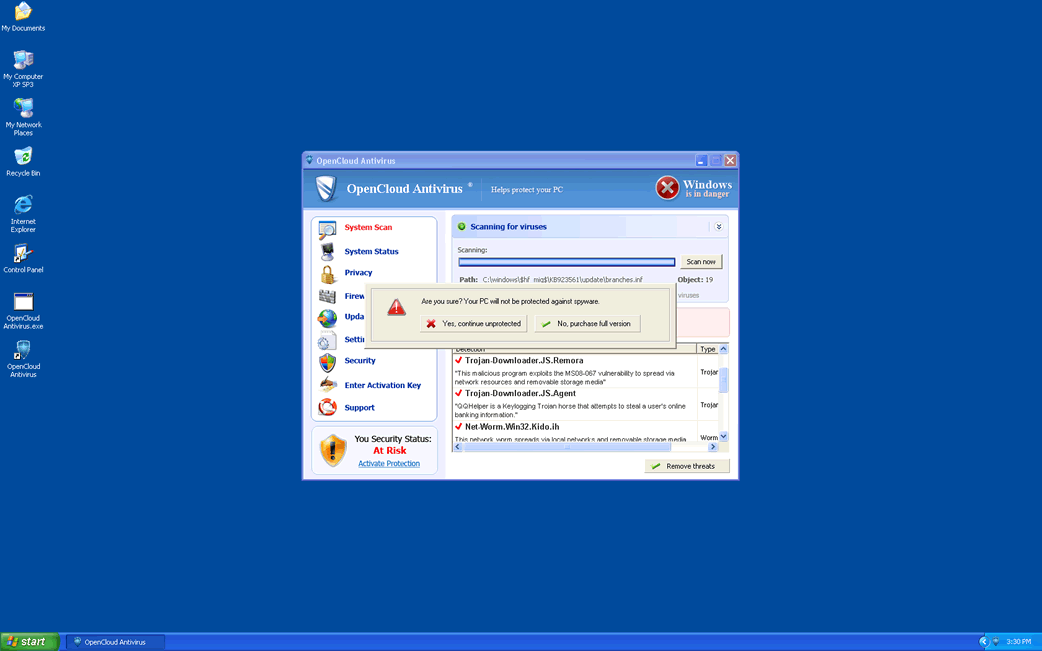Explorespot.io
Threat Scorecard
EnigmaSoft Threat Scorecard
EnigmaSoft Threat Scorecards are assessment reports for different malware threats which have been collected and analyzed by our research team. EnigmaSoft Threat Scorecards evaluate and rank threats using several metrics including real-world and potential risk factors, trends, frequency, prevalence, and persistence. EnigmaSoft Threat Scorecards are updated regularly based on our research data and metrics and are useful for a wide range of computer users, from end users seeking solutions to remove malware from their systems to security experts analyzing threats.
EnigmaSoft Threat Scorecards display a variety of useful information, including:
Ranking: The ranking of a particular threat in EnigmaSoft’s Threat Database.
Severity Level: The determined severity level of an object, represented numerically, based on our risk modeling process and research, as explained in our Threat Assessment Criteria.
Infected Computers: The number of confirmed and suspected cases of a particular threat detected on infected computers as reported by SpyHunter.
See also Threat Assessment Criteria.
| Ranking: | 8,383 |
| Threat Level: | 20 % (Normal) |
| Infected Computers: | 20 |
| First Seen: | May 17, 2024 |
| Last Seen: | May 20, 2024 |
| OS(es) Affected: | Windows |
An investigation has uncovered that Explorespot.io functions as a deceptive search engine website. Researchers identified this site being advertised through an intrusive browser hijacker called Explore Spot. Initially marketed as a tool to enhance browsing, Explore Spot actually manipulates browser configurations to favor the explorespot.io illegitimate search engine, often through redirects.
Table of Contents
Explorespot.io Replaces Fundamental Browser Settings
Browser hijackers are software programs that make changes to browser settings, such as default search engines, homepages, and new tab/windows settings. These alterations can compel users to visit specific websites every time they open a new browser tab/window or conduct a Web search using the URL bar. Explore Spot, for instance, directs users to the explorespot.io Web page through these redirects. Typically, fake search engines like explorespot.io lack the capability to provide genuine search results and often redirect users to legitimate internet search sites.
Explorespot.io, in turn, leads users to boyu.com.tr, another deceptive search engine. While boyu.com.tr can generate search results, they are unreliable and may contain sponsored, untrustworthy, deceptive and potentially unsafe content. It's worth noting that the redirection destination of explorespot.io may vary and be influenced by factors such as user geolocation.
Browser-hijacking software employs various techniques to ensure persistence and prevent users from easily reverting the affected browser settings. Explore Spot, for example, leverages the 'Managed by your organization' feature in Google Chrome for this purpose.
Moreover, rogue extensions like Explore Spot often engage in surveillance of users' browsing activities, as data tracking is a common functionality of browser hijackers. The harvested information may include visited URLs, viewed Web pages, search queries, browser cookies, usernames/passwords, personally identifiable information, financial data and more. This data can be sold to third parties or exploited for profit in other ways.
Users Almost Never Install PUPs (Potentially Unwanted Programs) and Browser Hijackers Knowingly
Users might inadvertently install PUPs and browser hijackers on their devices due to exploited questionable distribution practices. These practices often involve deceptive or misleading tactics that obscure the true nature of the software being installed, leading users to overlook or misunderstand what they are agreeing to.
One common method is bundling, where PUPs and browser hijackers are included with legitimate software downloads. During the installation process, users may rush through or overlook the fine print in the terms of service agreements, leading them to unintentionally agree to install additional software they did not intend to.
Another tactic is through misleading advertisements or pop-ups that mimic system alerts or warnings, tricking users into believing they need to install certain software for security or performance reasons. These ads may be designed to look legitimate and authoritative, further deceiving users into downloading potentially harmful programs.
Additionally, some PUPs and browser hijackers may disguise themselves as useful or legitimate tools, promising enhanced browsing experiences, improved system performance, or other desirable features. Users may be enticed to install these programs without fully understanding their potential negative impact.
Furthermore, some distribution channels exploit loopholes or lax security measures in software download platforms or third-party app stores, allowing PUPs and browser hijackers to be distributed alongside legitimate software without proper scrutiny.
Overall, these questionable distribution practices exploit users' trust and lack of awareness, making it difficult for them to realize they have installed PUPs and browser hijackers on their devices until they begin experiencing symptoms such as unwanted pop-ups, browser redirects, or changes to their browser settings.
URLs
Explorespot.io may call the following URLs:
| explorespot.io |

